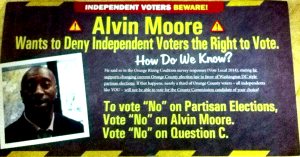
A recent direct mail piece ostensibly sent by the Republican Party of Orange County to District -2 independents claims that moving local elections from the August primary to the November general election would disenfranchise voters if passed. “Independents like YOU will not be able to vote for the County Commission candidate of your choice,” reads the postcard, imploring voters to turn down Charter Amendment Question C.
If there were a prize for political bad faith, this mailer would slither away with it. It’s a deliberate attempt to mislead voters, which might not be too difficult because almost everyone is confused by our current primary/run-off system. Republicans have it good under this system and they’re terrified they might lose it in a popular vote.
So what are they talking about that Independents can’t vote? Well, they can’t vote in a primary. Instead they vote in the general — same as with every other office voted on: President, Senate, Congress. Everything. Indeed, moving the local elections to the November ballot will disqualify a No Party Affiliate [NPA] to vote in a Republican or Democratic primary. Instead they’ll vote between the two in the General, which is a far cry from being disenfranchised.
Here are the facts:
The ballot initiative is actually designed to bring more independent voters into the process. Signed by more than 50,000 Orange County voters, there does seem to be popular support behind the idea. And it’s no wonder because our current system is a confusing mess.
The Orange County Commission election is held in August on the Primary ballot which few independents care about. In 2010 only 8.5 percent of NPAs voted in August compared to 33 percent who cast ballots in November. That’s four times the independent voter turnout: 11,750 in August versus 47,013 in November.
Deciding these races in the General Election with candidates chosen in primaries would engage many more Orange County voters in our local government. This should be a good thing.
Likewise, knowing whether a candidate is a proud Republican, Democrat, or Independent is our primary way of communicating political viewpoint. If you’re not speaking in terms, then no one really knows what you stand for. Why are Republicans so determined to keep their identity a secret?
One possible answer that is always mentioned is that there’s a strategic advantage for them. Here’s the breakdown of voters in Orange County from the Supervisor of Elections website.
Dem. 302,762
Rep. 205,314
Other 44,571
NPA 168,533
But there’s another more nuanced feature to the current system that favors patrons of deep-pocketed big business which tend to be . In this “primary” system, the race goes to a runoff only if no one garners “50 percent plus one.” A candidate “wins it all” and does not have to face voters in the fall, if they grab a simple majority of votes.
Local politicos have figured out that running a spoiler in a close race is an effective strategy to peel votes away from a convincing challenger. This happens naturally when there’s multiple candidates from the same party running for the same seat. But, if a local party wanted to increase their chance of winning a tight race in the primary, they can run a spoiler candidate to peel off votes from the serious challenger. This is made all the easier in this so-called “non-partisan” election where party affiliation doesn’t have to be disclosed.
All of this nuance and nastiness turns people off from our already Byzantine local elections. Do we want more people to be engaged in local government, or don’t we?
In a county that is solidly blue, the fact that there’s only one Democrat on the county commission shows how wildly unrepresentative this system is. If it were the other way around, Republicans would be screaming bloody murder. Democrats and Independents should be freaking out about this because they’re actually fighting for real people.
Knowing which party your county commissioner belongs to does not make your government “partisan.” It makes your government transparent. Right now we have “non-partisan” elections for county government, and our Mayor plus five commissioners take marching orders directly from the Republican Party chair and big business lobbyists via text messages, and possibly via Dropbox exchange. Governing by lobbyist agenda makes our government partisan AND corrupt. That is the real problem.
It’s time to demand transparency and accountability from this body, and voting yes on Charter Amendment “Question C” is a great first step in that direction.